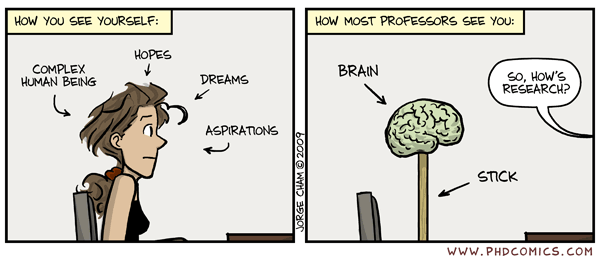chicken soup for the cs phd student
Pieces of writings that I found helpful for thinking about research and surviving a PhD.
De-Mystifying Good Research and Good Papers, by Fei-Fei Li
read it here.
I’m putting this one first because it’s a succint yet powerful read. It’s easy to be caught up in the “publish or perish” culture and the race of metric hacking / low-hanging fruits; this article serves as a good reminder of that’s not why we are here doing research.
Every research project and every paper should be conducted and written with one singular purpose: to genuinely advance the field of computer vision. So when you conceptualize and carry out your work, you need to be constantly asking yourself this question in the most critical way you could – “Would my work define or reshape xxx (problem, field, technique) in the future?”
This means publishing papers is NOT about “this has not been published or written before, let me do it”, nor is it about “let me find an arcane little problem that can get me an easy poster”. It’s about “if I do this, I could offer a better solution to this important problem,” or “if I do this, I could add a genuinely new and important piece of knowledge to the field.”
You and Your Research, by Richard Hamming
read it here.
A classic and important reading for any researcher in science. In his talk (linked is a transcription) Hamming talks about what constitutes important work, why do it, and how to do it. The arguments are interlaced with cool personal science anecdotes and lined with optimism – it reminded me of why I am here doing grad school in the first place. I first heard about the talk’s existence, funnily enough, from Paul Graham, but I’ve seen scientists I look up to reference it again and agian, from when they’re feeling burnt out to when facing important decisions. It carries a message worth bearing in our minds as we go about, well, being us and doing our research.
The PhD Grind, by Phillip Guo
(update: Phillip took down the book; see his FAQ. you may still find copies online. Perhaps instead, check out his Advice for early-stage Ph.D. students.)
The pitch I generally give people about this book is that Phillip encountered a pretty comprehensive set of problems for a CS PhD student, and prevailed (!). In this mini memoir he writes with clarity, provides sound analysis, and offers precious advices. Whatever problem you are experiencing, you are likely to find a way to reason about it from this book. Feel like you are just doing grunt work? Find it hard to communicate with you advisor? Anxious about not publishing (whereby proving your competence)? Deciding between industry vs academia? Phil’s got you.
It is both endearing and inspiring to learn about his journey, and to know that he came out ok (he’s a professor at UCSD now!). I really appreciate the honesty and detail he put into this work. Thank you!
Other Interesting things
- An illustrated guide to PhD
- How to transform into a senior PhD student
- A PhD Is Not Enough!: A Guide to Survival in Science (book)
- phd comics
